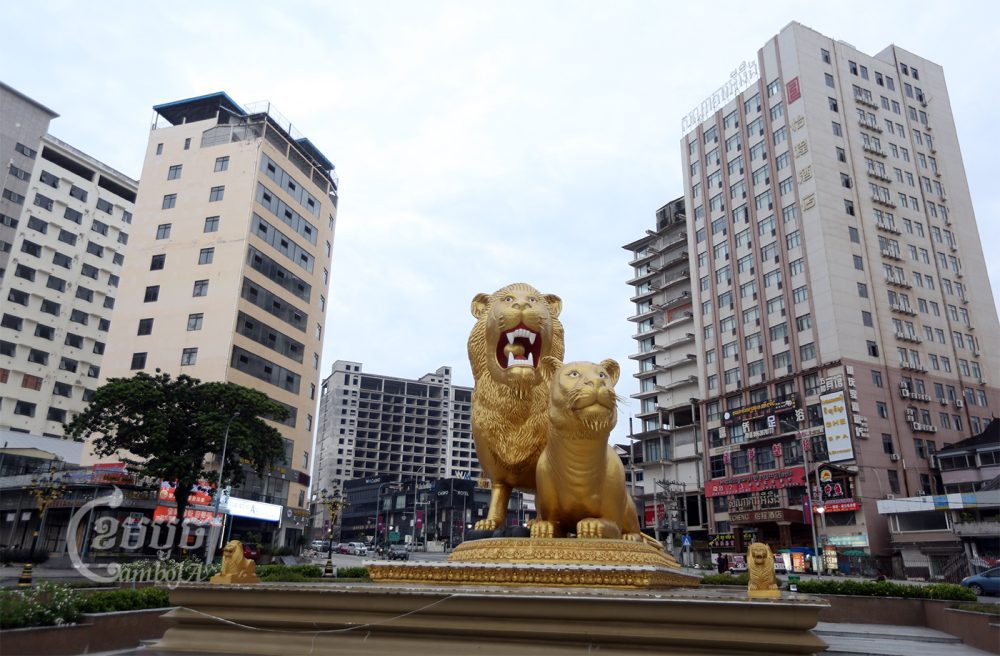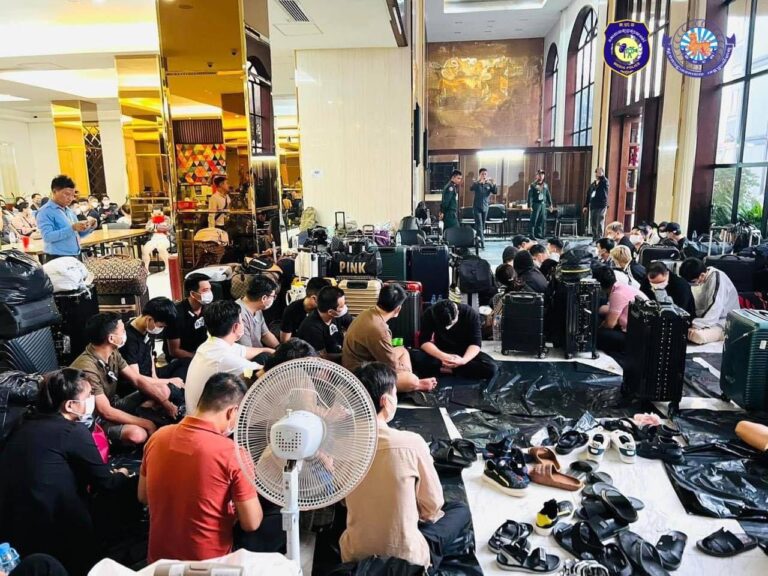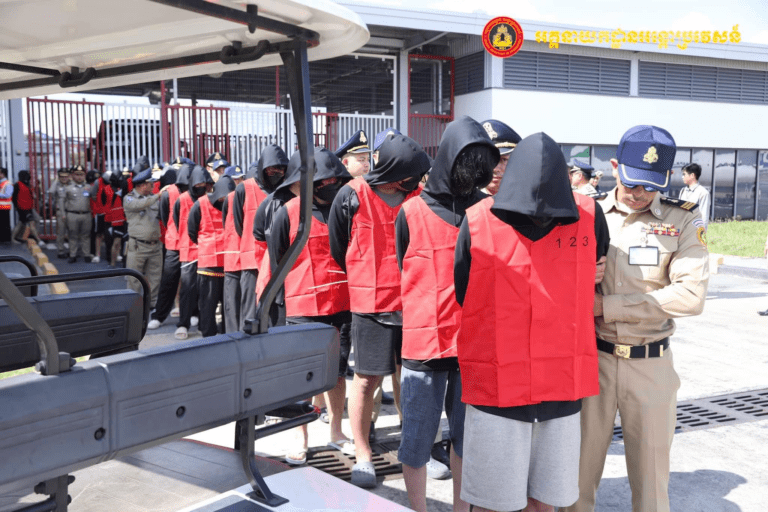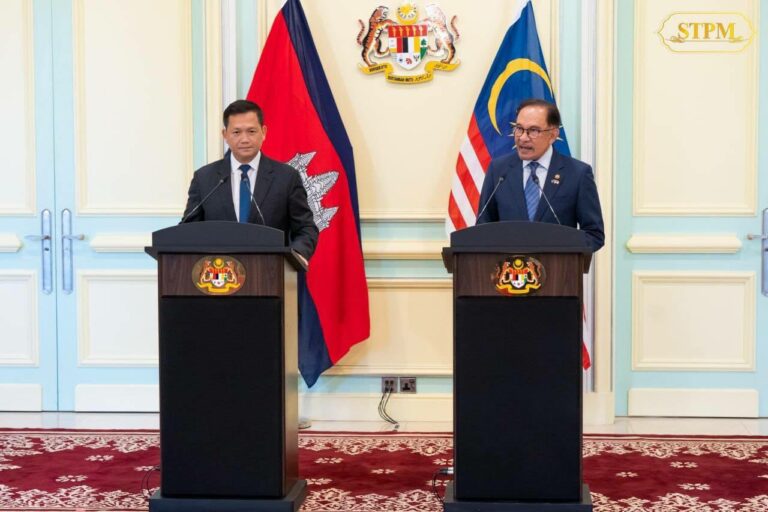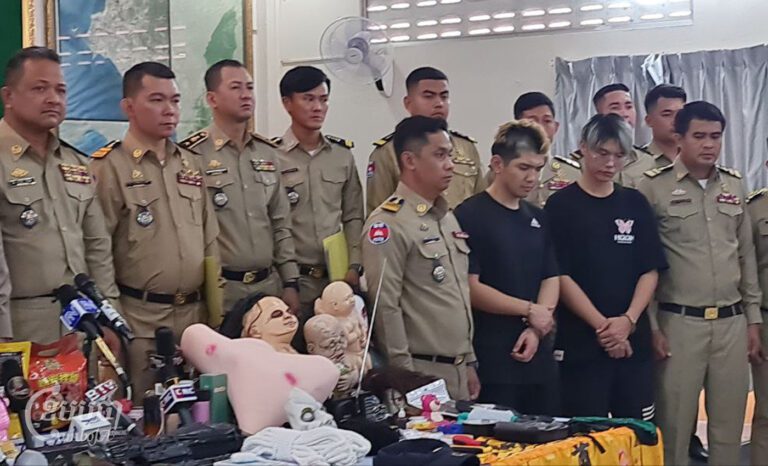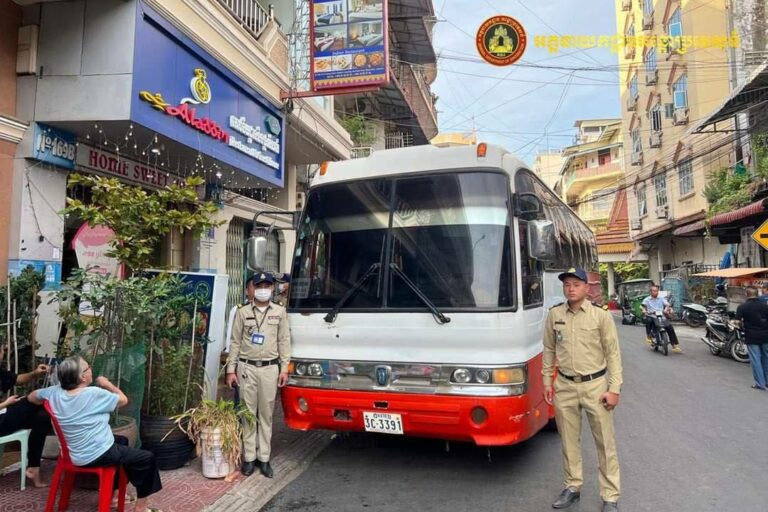Nearly 500 foreign nationals were found by authorities at a Sihanoukville compound where illegal gambling, confinement, torture, human trafficking and other crimes were perpetrated, officials said on Sunday, after months of official denials of widespread human trafficking in the country.
Twenty-seven foreigners were arrested at the mixed-use business compound of Bing Cheng International Entertainment company during a five-day police operation last week that saw over 8,700 mobile phones, more than 800 computers and a dozen data drives confiscated, in addition to several pistols, pairs of handcuffs and 10 electric-stun batons.
Cambodia’s coastal city has become synonymous with reports of online scam compounds operated by organized crime groups that enslave people, mostly from China and around Southeast Asia, and force them to carry out scams estimated to have earned criminals billions of dollars by defrauding people around the world.
During the police operation from last Tuesday to Saturday at the Bing Cheng compound in Sihanoukville’s Bei commune, Preah Sihanouk provincial authorities reported finding 495 foreigners from four countries, including 130 Chinese nationals and 11 Vietnamese nationals who had entered Cambodia illegally and an additional 262 foreign nationals who were working in the country without work permits. Authorities also said the compound was the site of illegal weapons possession, prostitution and money laundering.
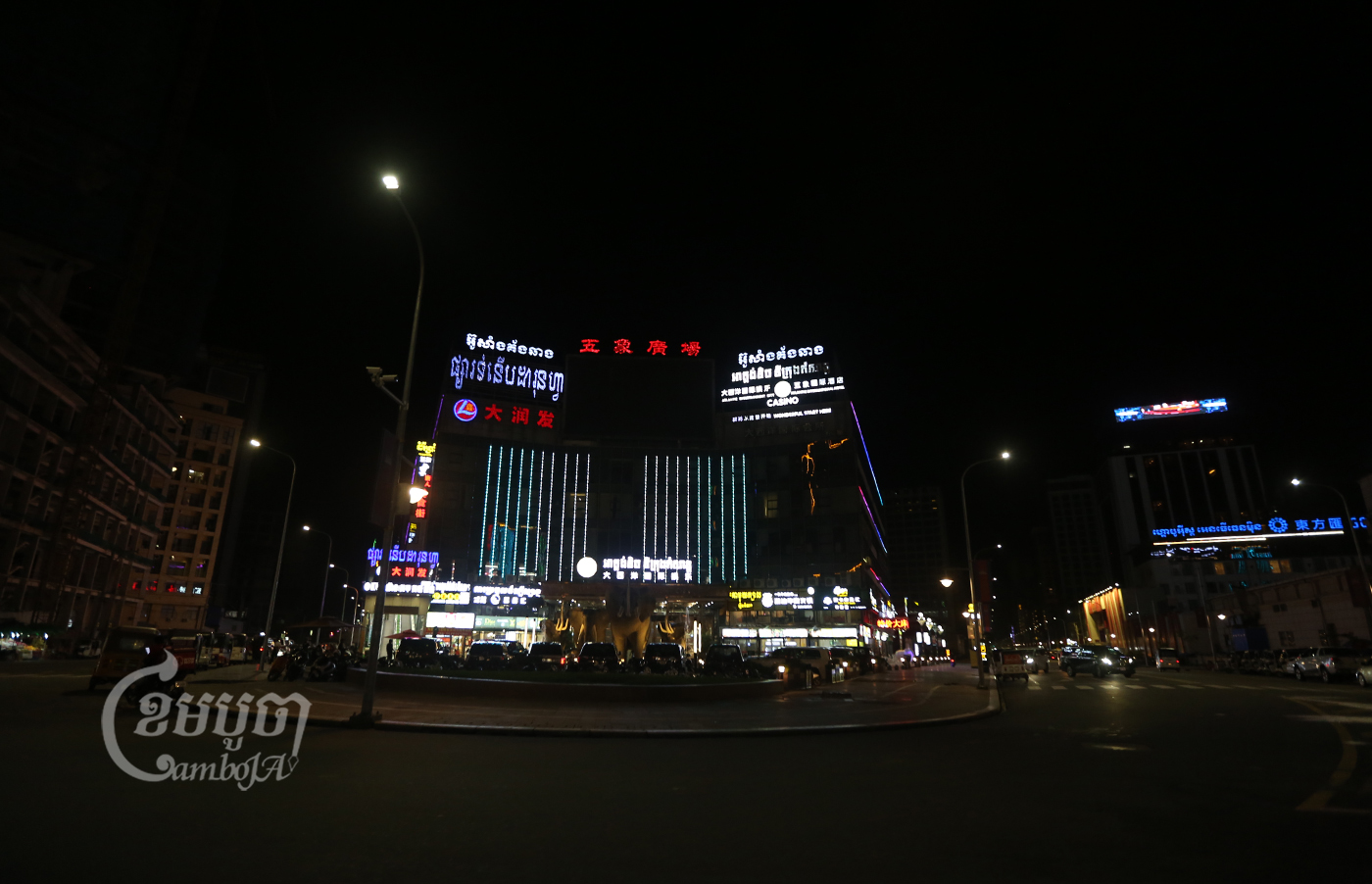
The 27 people detained, including 12 suspects, 10 alleged sex workers and five unspecified victims, were sent to the provincial police station for questioning, while 141 others were detained by immigration authorities, Preah Sihanouk authorities said in a statement. The government levied fines of about $79,000 for the hundreds of foreign nationals not having work permits or paying taxes. The company was fined nearly 7 million riel (about $1,700) for not declaring the number of its foreign workers and employing people without work permits.
As officials on Thursday announced the investigation into Bing Cheng, and have touted a wider crackdown on human trafficking and online scams, rights advocates have voiced doubt about the effectiveness of law enforcement measures, citing the likelihood that powerful elites were behind the wide-reaching crimes and would hinder police investigations.
“Most forced labor and human trafficking involves with some high-ranking officials and it is related to corruption,” said Moeun Tola, executive director of labor rights group Central.
While the Interior and Justice ministries this month formed a joint anti-trafficking and anti-money laundering committee, Tola said creating additional working groups to combat human trafficking should not be necessary as the government already had law enforcement mechanisms in place.
“The issue is if authorities dare to take action on the cases involving those officials,” he said.
“95% True”
In recent months, a growing number of reports from media, NGOs and foreign embassies have described a network of cyber-scam operations that rely on large numbers of foreigners trafficked in Cambodia, with many found in compounds in Preah Sihanouk province, which became a hub for Chinese-owned casinos and online gambling before the latter was banned in 2019.
Investigations by local news outlet VOD and international outlet Al Jazeera have exposed links between sealed-off scam compounds and powerful business and political elites in the country.
“Although many cases have been prosecuted, just a few perpetrators behind the crimes have been brought to justice, thus the issues are getting worse,” Soeng Senkaruna, spokesperson for rights group Adhoc, said last week. “I understand that the crimes may involve some powerful and influential officials whom the authorities do not dare to touch.”
Authorities needed to be more careful in licensing businesses and checking everyone suspected of being involved in human trafficking and forced labor, he said, adding that the involvement of powerful people would render authorities’ crackdown ineffective.
On Monday, during a meeting with officials, Interior Minister Sar Kheng said that from August 18 to September 18, the ministry received 289 complaints related to human trafficking, spanning nine provinces and Phnom Penh, from victims, their relatives, foreign embassies and international organizations. In the one month period, 212 of the complaints came from Sihanoukville.
“With all these complaints, we did not believe it at first, but after going through the actual implementation, it was about 95% true,” Sar Kheng said.
The minister warned earlier this month that Cambodia could find itself on international trafficking and money laundering blacklists if problems were not addressed soon.
“If we cannot get the country off of the [money laundering] gray list, one day we may fall onto the blacklist. When we are on the blacklist, our banking transactions will be zero and this would be devastating for the national economy,” he said, adding that human trafficking was equally devastating.
Chou Bun Eng, vice chairperson of the Interior Ministry’s National Committee for Counter Trafficking, said authorities were creating mechanisms to effectively address the crimes, adding that cooperation was needed. She dismissed allegations that there were powerful people behind the crimes.
“As long as we can find evidence, we will punish them without exception,” she said. “We do not extend the search to all places unless there is no doubt of linking [the place] with a crime; [otherwise] that it is a violation of the business’s rights.”
Bing Cheng Operation
Preah Sihanouk authorities on Sunday said all businesses in the Bei commune compound where Bing Cheng was operating had been closed while authorities continue to investigate money laundering and illegal gambling at the site.
The compound houses three buildings that include 267 residential rooms, 51 offices, 11 restaurants and a convenience store, salon and club, officials said. Police are seeking the arrest of one mastermind.
Provincial administration spokesperson Kheang Phearum told CamboJA on Monday that Bing Cheng had a business license to operate in Buon commune but instead operated in Bei commune. Authorities were still investigating three other locations in the city where criminal activity is suspected, Phearum said.
The chairperson of Bing Cheng International Entertainment Co. is Eong Vannrith, according to the Commerce Ministry’s online business registry. Bing Cheng’s registered business activities include gambling and betting, hotels, restaurants, night clubs, real estate, and warehousing and storage services.
A reporter’s email sent Friday and calls to the phone number listed on the registry went unanswered as of Tuesday morning.
According to corporate watchdog database Open Corporates, Vannrith is a registered director of at least four other firms in Sihanoukville’s Bei and Buon communes.
Preah Sihanouk authorities this month began requiring business owners to report the presence of foreign workers at their workplaces as reports of trafficking and confinement of foreign nationals in scam compounds have soared in the coastal province.
In August, provincial authorities said they secured the release of more than 100 foreign nationals after cracking down on a number of businesses involved in confinement, forced labor and human trafficking.
Avoiding Blacklists
Am Sam Ath, operations director of rights group Licadho, said that after harsh criticism from the international community over human trafficking, the government had stepped up its efforts to crack down on crimes that authorities previously denied.
“This is a very serious issue for Cambodia because it will also affect tourism and investment in Cambodia,” he said. “This requires Cambodia to be highly committed to prevent the country from being a place of human trafficking.”
Sam Ath said Cambodia needed to strengthen law enforcement, particularly immigration and anti-corruption measures, to prevent illegal entry into the country, even if those involved in crimes are connected to powerful officials.
Anthony Galliano, a tax expert and group CEO of financial services company Cambodian Investment Management Holding, said the trafficking problem was generating international attention with mounting reports of workers from across Asia being trafficked into cybercrime rings operating in Cambodia. But he said he believed the Cambodian government was “committed to addressing the evolving and escalating problem.”
In 2019, the Financial Action Task Force (FATF), a global money-laundering watchdog, placed Cambodia on its “grey list,” citing Cambodia’s lack of policies to counter money laundering and terrorism financing.
In June, the FATF expressed concern that Cambodia had failed to meet anti-money laundering and counter terrorism financing benchmarks, citing the need for the government to demonstrate “an increase in the freezing and confiscation of criminal proceeds, instrumentalities, and property of equivalent value.”
The intergovernmental task force also urged Cambodia to complete its action plan by October or the FATF “will consider calling on its members and urging all jurisdictions to apply enhanced due diligence to business relations and transactions with Cambodia.”
Galliano said the FATF’s evaluation mentioned the country has made minimal use of financial intelligence in investigating money laundering in the casino and real estate sectors.
“FATF member states and other international bodies will likely impose economic penalties and other restrictive measures against Blacklisted states,” he said.


